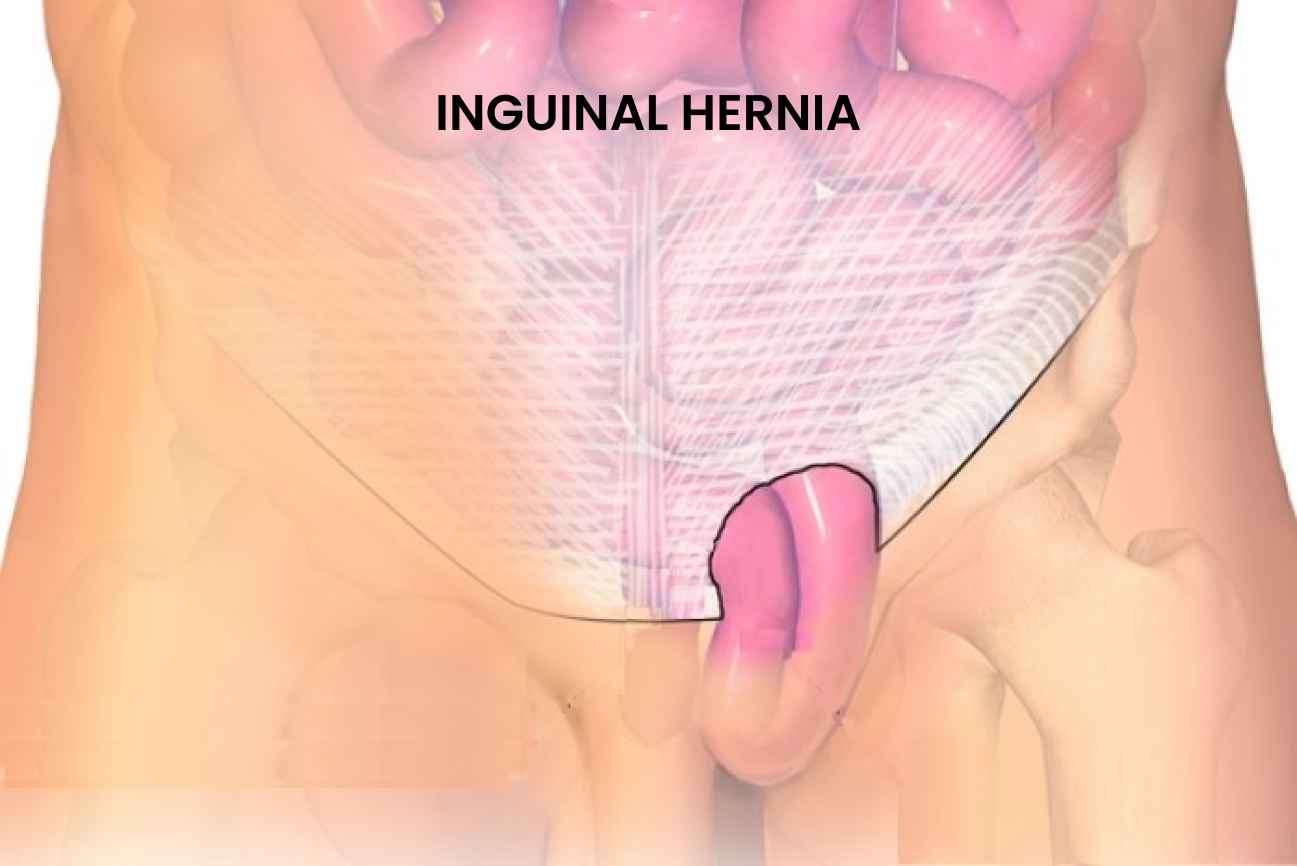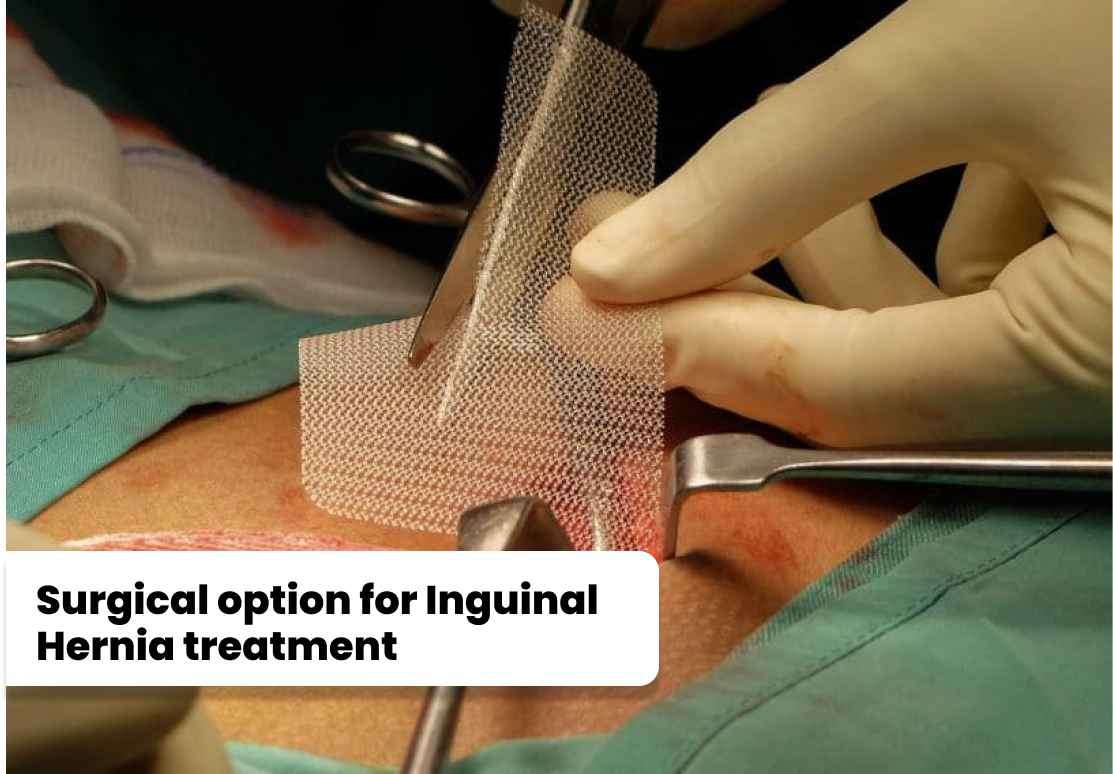Inguinal hernia is a condition characterized by a protrusion of abdominal contents through a weak spot in the groin area.
Call us to book a appointment with the best laparoscopy surgeon near you.
An inguinal hernia occurs when soft tissue, such as a part of the intestine, protrudes through a weak spot or tear in the abdominal muscles in the groin area. It is a common condition that requires treatment to prevent complications and relieve symptoms. In this article, we will discuss the various treatment options for inguinal hernia, including surgical procedures and non-surgical approaches.

An inguinal hernia occurs when soft tissue, such as a part of the intestine, protrudes through a weak spot or tear in the abdominal muscles in the groin area. It is a common condition that requires treatment to prevent complications and relieve symptoms. In this article, we will discuss the various treatment options for inguinal hernia, including surgical procedures and non-surgical approaches.
Given below are the inguinal hernia surgery types Double Hernia Surgery: In some cases, individuals may have hernias on both sides of the groin. Double hernia surgery, also known as bilateral hernia repair, involves repairing both hernias during a single surgical procedure. This approach saves time and reduces the need for two separate surgeries. Herniotomy Surgery: Herniotomy is a surgical procedure in which the hernia sac is removed, and the hernia opening is repaired. This approach is commonly used for inguinal hernias and is associated with a low risk of complications. Inguinal Hernia Open Surgery: Open hernia repair involves making an incision in the groin area to access the hernia and repair the weakened abdominal wall. The surgeon may use stitches or synthetic mesh to reinforce the area. This traditional approach allows for direct visualization and repair of the hernia. Surgical Management of Inguinal Hernia: There are different surgical techniques available for inguinal hernia repair, including tension-free repair with mesh, laparoscopic hernia repair, and robotic-assisted hernia repair. These minimally invasive approaches involve smaller incisions, reduced postoperative pain, and quicker recovery compared to open surgery.

Given below are the inguinal hernia surgery types
Double Hernia Surgery: In some cases, individuals may have hernias on both sides of the groin. Double hernia surgery, also known as bilateral hernia repair, involves repairing both hernias during a single surgical procedure. This approach saves time and reduces the need for two separate surgeries.
Herniotomy Surgery: Herniotomy is a surgical procedure in which the hernia sac is removed, and the hernia opening is repaired. This approach is commonly used for inguinal hernias and is associated with a low risk of complications.
Inguinal Hernia Open Surgery: Open hernia repair involves making an incision in the groin area to access the hernia and repair the weakened abdominal wall. The surgeon may use stitches or synthetic mesh to reinforce the area. This traditional approach allows for direct visualization and repair of the hernia.
Surgical Management of Inguinal Hernia: There are different surgical techniques available for inguinal hernia repair, including tension-free repair with mesh, laparoscopic hernia repair, and robotic-assisted hernia repair. These minimally invasive approaches involve smaller incisions, reduced postoperative pain, and quicker recovery compared to open surgery.
Inguinal Hernia Treatment Without Surgery: In some cases, when the hernia is small and not causing significant symptoms, non-surgical management may be an option. This approach involves monitoring the hernia for any changes and implementing lifestyle modifications, such as avoiding heavy lifting, maintaining a healthy weight, and using supportive measures like wearing a supportive garment or truss. Inguinal Hernia Supportive Therapy: Supportive therapy involves using supportive garments or trusses to provide gentle compression and support to the hernia area. While these measures do not cure the hernia, they can help alleviate symptoms and provide temporary relief. Medical Management of Inguinal Hernia: Medications are not a primary treatment for inguinal hernia. However, they may be prescribed to manage symptoms such as pain or discomfort associated with the hernia. It's important to note that medications cannot repair the hernia and are typically used as a temporary measure.

Inguinal Hernia Treatment Without Surgery: In some cases, when the hernia is small and not causing significant symptoms, non-surgical management may be an option. This approach involves monitoring the hernia for any changes and implementing lifestyle modifications, such as avoiding heavy lifting, maintaining a healthy weight, and using supportive measures like wearing a supportive garment or truss.
Inguinal Hernia Supportive Therapy: Supportive therapy involves using supportive garments or trusses to provide gentle compression and support to the hernia area. While these measures do not cure the hernia, they can help alleviate symptoms and provide temporary relief.
Medical Management of Inguinal Hernia: Medications are not a primary treatment for inguinal hernia. However, they may be prescribed to manage symptoms such as pain or discomfort associated with the hernia. It's important to note that medications cannot repair the hernia and are typically used as a temporary measure.
Inguinal Hernia After Surgery: In some cases, a hernia may recur after surgical repair. Recurrence rates vary depending on factors such as the surgical technique used, the patient's overall health, and lifestyle factors. Follow-up appointments with the healthcare provider are crucial to monitor the surgical site and detect any recurrence early on.

Inguinal Hernia After Surgery: In some cases, a hernia may recur after surgical repair. Recurrence rates vary depending on factors such as the surgical technique used, the patient's overall health, and lifestyle factors. Follow-up appointments with the healthcare provider are crucial to monitor the surgical site and detect any recurrence early on.
The cost of inguinal hernia surgery in India may vary depending on factors such as the hospital, surgeon's fees, type of surgery, and additional medical expenses. It is advisable to consult with healthcare providers or hospitals to obtain accurate cost information specific to individual circumstances.
|
Serial No |
City |
Average Cost (INR) |
Minimum Cost (INR) |
|
1 |
Delhi |
40,000 - 1,50,000 |
30,000 |
|
2 |
Mumbai |
35,000 - 1,50,000 |
25,000 |
|
3 |
Bangalore |
35,000 - 1,50,000 |
25,000 |
|
4 |
Chennai |
35,000 - 1,50,000 |
25,000 |
|
5 |
Hyderabad |
35,000 - 1,50,000 |
25,000 |
|
6 |
Kolkata |
35,000 - 1,50,000 |
25,000 |
|
7 |
Pune |
35,000 - 1,50,000 |
25,000 |
|
8 |
Ahmedabad |
30,000 - 1,20,000 |
20,000 |
|
9 |
Jaipur |
30,000 - 1,20,000 |
20,000 |
|
10 |
Chandigarh |
30,000 - 1,20,000 |
20,000 |
|
11 |
Lucknow |
30,000 - 1,20,000 |
20,000 |
|
12 |
Indore |
30,000 - 1,20,000 |
20,000 |
|
13 |
Kochi |
30,000 - 1,20,000 |
20,000 |
|
14 |
Bhopal |
30,000 - 1,20,000 |
20,000 |
|
15 |
Coimbatore |
30,000 - 1,20,000 |
20,000 |
|
16 |
Nagpur |
30,000 - 1,20,000 |
20,000 |
|
17 |
Ludhiana |
30,000 - 1,20,000 |
20,000 |
|
18 |
Goa |
30,000 - 1,20,000 |
20,000 |
|
19 |
Varanasi |
30,000 - 1,20,000 |
20,000 |
|
Serial No |
Hospital Name |
Address |
Contact Number |
|
1 |
All India Institute of Medical Sciences (AIIMS) |
Ansari Nagar, Aurobindo Marg, New Delhi - 110029 |
+91-11-26588500 |
|
2 |
Safdarjung Hospital |
Safdarjung Campus, Ansari Nagar, New Delhi - 110029 |
+91-11-26165060 |
|
3 |
Post Graduate Institute of Medical Education and Research (PGIMER) |
Sector-12, Chandigarh - 160012 |
+91-172-2747585 |
|
4 |
King George's Medical University (KGMU) |
Chowk, Lucknow, Uttar Pradesh - 226003 |
+91-522-2257450 |
|
5 |
All India Institute of Medical Sciences (AIIMS) |
Saket Nagar, Bhopal, Madhya Pradesh - 462020 |
+91-755-2672355 |
|
6 |
Nizam's Institute of Medical Sciences (NIMS) |
Punjagutta, Hyderabad, Telangana - 500082 |
+91-40-23489000 |
|
7 |
Bangalore Medical College and Research Institute (BMCRI) |
Fort, Krishna Rajendra Rd, Bengaluru, Karnataka - 560002 |
+91-80-26700810 |
|
8 |
Sir J.J. Group of Hospitals |
J.J. Marg, Nagpada-Mumbai Central, Mumbai, Maharashtra - 400008 |
+91-22-23735555 |
|
9 |
Medical College and Hospital, Kolkata |
88, College Street, Kolkata, West Bengal - 700073 |
+91-33-22865631 |
|
10 |
Christian Medical College and Hospital (CMC) |
Ida Scudder Road, Vellore, Tamil Nadu - 632004 |
+91-416-2281000 |
Please Wait..